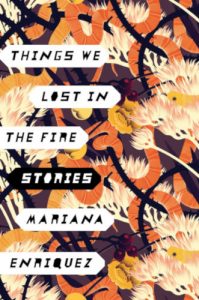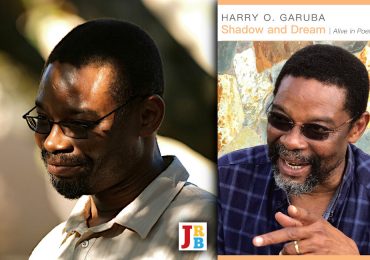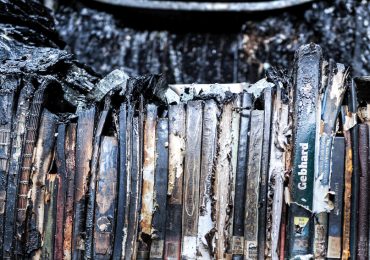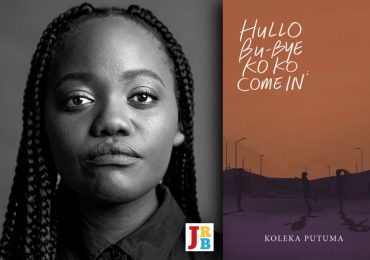Mariana Enríquez, a writer and editor based in Buenos Aires, will be at the Open Book Festival in Cape Town in September. She is the author of two novels, two short story collections, a biography of the legendary Argentinian writer Silvina Ocampo, a chronicle on cemeteries and a novella. Her fiction has appeared in the New Yorker, Granta, Freeman’s, McSweeney’s, Electric Literature and the Virginia Quarterly Review. She spoke with Bongani Kona about the aftermath of Argentina’s violent past and her English-language debut, Things We Lost in the Fire, among other things.
 Things We Lost in the Fire
Things We Lost in the Fire
Mariana Enríquez
Hogarth Press
Bongani Kona for The JRB: A lot of the stories in Things We Lost in the Fire have an unsettling, strange and mysterious quality to them (and we’ll get to that), but beneath that is a detectable love for storytelling. So, I wonder if we could start with your childhood in Buenos Aires, and in particular, the kind of stories you grew up with.
Mariana Enríquez: I grew up in the outskirts of Buenos Aires, what we call Greater Buenos Aires or ‘Conurbano’, in a town called Lanús. It was, and is, a neighbourhood that has nothing you can relate in any way with a literary or intellectual life: a bit tough, lots of factories that during my childhood started to close down, basically a working-class place, quite ugly too. I mean I like it but it has nothing bucolic or remotely resembling nature or anything. My parents were avid readers though and they had a massive collection of books. Everything from Argentinian literature to European, American and South American literature; from García Márquez to Capote to Poe, and more weird things too. I used to like Baudelaire and the Brontës, I always liked dark stuff. I had no restrictions and could read anything. It was the greatest way of somehow imagining that I was living somewhere prettier or more interesting, I guess. My grandmother was an involuntary storyteller, too. I don’t think she enjoyed telling stories or anything like that, it was just in her culture, she was the daughter of Italian immigrants who came to Buenos Aires from the north of Argentina, a place very different from Buenos Aires, very superstitious and rural.
The JRB: In ‘Adela’s House’, the narrator is forbidden by her mother from watching horror movies because she’s ‘too little’. Most parents or guardians tend to do that, they try to shield their children from knowing the full horror of the world. I’m wondering if it was like that for you, too. 1976–1983 was a grotesquely violent period in Argentina’s history. Thousands of people were tortured, killed or disappeared. As a child, how aware were you of what was happening? Were some stories hidden from you?
Mariana Enríquez: You have to keep in mind that the dictatorship in Argentina was incredibly violent but in a very secret way. Thousands were tortured and killed, yes, but this was very successfully hidden from the population. Somehow many people today say they didn’t know about the extent of the grotesquerie—and they are not lying. The military was not shooting in the streets. They were kidnapping people into clandestine detention centers. This caused, of course, a lot of fear, and some of it was fear of the unknown, of not really knowing what was going on. Even the disappeared: the situation was phantasmagoric. My parents knew what was going on but it was spoken in whispers and, whenever I understood something, I was told never to talk about it outside the house. And ‘outside’ meant school and birthday parties and the daily life that went on. So I was aware because my parents were aware, but there were no obvious signs of violence, not for a child anyway. Only sometimes there was news of a neighbour who had ‘gone’, never to come back, or the military guarding the bridge … it was a secret, a terrible secret. When it ended, it was like an explosion. The morbid details were everywhere, TV, magazines, and of course the trials of the generals where the victims told their stories, the cruelty was explicit. I remember reading about it and being so terrified. I think those were the first horror stories I ever read. This was not hidden from me at all, quite the contrary. My parents wanted me to know. The memory of what happened is a political statement to them and, in a way, for many people in our society. I have a Colombian friend who always says to me that we have too much memory. I understand what she means, but it’s the way it is.
The JRB: You’ve said elsewhere that such widespread political violence ‘leaves scars, like a national PTSD’. And, in a way, the stories in Things We Lost in the Fire shine a light on those scars. Haunted houses, deformed bodies, polluted rivers, all point to the ‘horrifying history of state terror’, to quote your English translator, Megan McDowell. How else do you see this ‘national PTSD’ manifesting in everyday life?
Mariana Enríquez: Well nowadays it has descendants. It’s not just metaphorical scars, but people. The children of the disappeared, who are about my age. The children that the military stole from their parents and gave to other families to raise: they are now men and women and Abuelas de Plaza de Mayo [a human rights organisation] looks for them and finds them. These are people who lived a life with a different identity. And every political discussion is imprinted by the issues of the seventies. For example: now we have basically a neoliberal government and the opposition accuses it of having the same economic policies of the military dictatorship. If the government chooses to employ violence in, for example, a protest, very quickly it’s linked to the repression of those years. It’s not gone and sometimes it feels like it’s hard to move on.
The JRB: Despite this dark history, you’ve also written that ‘there is a great enthusiasm to write’ in Argentina. Where do you think it comes from? And when did you start to write? Was it something you’d always wanted to do?
Mariana Enríquez: Well, dark history is good for literature I think. Lots of ghosts, lots of issues. To me it’s more surprising that there is enthusiasm after so many economic crises. I’ve seen at least two enormous ones in my lifetime and I’m forty-four. But somehow that seems like an incentive. And personally, I don’t know if I wanted to write when I started. I published a novel when I was twenty-one. A big publisher was looking for a novel written by someone young with a ‘young theme’. The novel is called Bajar es lo peor and let’s say it’s a mixture of early Bret Easton Ellis and gothic sensibilities. But I arrived at the publishers by chance, through a series of weird connections. I had written the novel for myself, with no dreams of publishing. I was studying journalism in La Plata, a college town, and I was a pretty wild young woman. After publishing, and writing another novel, and working as a journo, I guess I found that this was what I wanted to do. But it took a while.
The JRB: Why did you choose to study journalism? What is it about journalism that attracted you?
Mariana Enríquez: I was very certain that I could write and to me that seemed the only way of making a living by writing. I never considered studying literature because I didn’t want to be a teacher or an academic (nowadays I do teach journalism but I’m still not interested in an academic life). Plus, I was and still am a music fan. I love music more than literature, I think. And when I was young and I dreamed of conducting interviews with rock stars and reviewing concerts. Plus, thinking about it now, I never liked the life of the writer that is not in touch with everyday life somehow, and journalism keeps you updated! I am an editor of an arts and culture paper now, but I did all kinds of things, including social and political reporting for a short time.
The JRB: Going back to the earlier question about when you started writing, were you immediately drawn to horror and gothic fiction? And who are some of the writers you feel indebted to?
Mariana Enríquez: Yes, always. It was the literature that made me feel, in the same way that movies and music did. And poetry. It was horror, gothic and poetry. Rimbaud, Anne Rice, Baudelaire, the Brontës, Ray Bradbury, Stephen King, Shirley Jackson, William Faulkner. It’s not the only literature I read, of course. I really enjoy American writers like Carson McCullers, Easton Ellis, Dennis Cooper, John Fante, Richard Ford. And, of course, Argentinians such as Borges, Manuel Puig or Silvina Ocampo or Roberto Arlt. I’m very eclectic. I’m a fan of horror, I collect and study horror and I have a special bookshelf for it, but it’s certainly not the only thing I read or enjoy. Right now, I’m obsessed with Anne Carson.
The JRB: What are you looking for when you read horror?
Mariana Enríquez: A particular vision and an unexplained mystery. A connection with real fears. That’s pretty much it.
The JRB: Returning to Things We Lost in the Fire, can you tell us a bit about the journey of this book? Did you have the entire collection mapped out when you started working on it?
Mariana Enríquez: I didn’t have it mapped. The book is a collection of stories I wrote in a span of three years, more or less, many published in magazines and anthologies. The thing was that I realised that there was a familiarity between them, the narrators, the tone, even the type of horror, that comes from realism, basically. So I chose the stories that were more related and the book was made.
The JRB: How did the English translation process work? And were you surprised by the reception?
Mariana Enríquez: It was very easy, really. The translator, Megan McDowell, lives in Chile, which made certain things fairly easy because she ‘gets’ the cultural references, she’s been in South America for several years, and plus Chile and Argentina are quite similar societies with similar histories. So, honestly, during the process we just exchanged emails. I was very surprised by the response because only a small number of books are translated in the first place and to be noticed out of those few was enough for me. The good reviews really startled me. But I know these things also happen because of luck. I enjoy it.
The JRB: There’s a line in an essay by Lidia Yuknavitch, ‘Woven’, in which she says, ‘In America, it’s tricky to describe violence without it turning into entertainment.’ Of course, your context is different, but I wonder if you could speak about both the challenges and necessity of writing violence.
Mariana Enríquez: Violence happens to us. It’s one of the things that, no matter how much we improve as a global society, we can’t get rid of. I really can’t think why or how we should avoid writing about violence in fear of it being entertainment. I think maybe Yuknavitch is talking about banalising or naturalising it, but even that is interesting to me. We can’t be blind and deaf about it. Yes, sometimes some people can ‘glamourise’ it, but that’s a risk; you can’t avoid trying not to think about violence. We have to think about it. And to me literature has always been a way of thinking about what happens to us. Violence is one of them.
The JRB: I guess one way of reading the title story of your collection is as a profound meditation on violence and responses to violence. ‘Burnings are the work of men’, says one of the characters, Maria. ‘Now we are burning ourselves. But we are not going to die; we’re going to flaunt our scars.’ Can I ask you to say a bit about how the story came to you?
Mariana Enríquez: The story came to me in 2013, more or less, when it was first published in a magazine in Peru. It was the early days of the international conversation about women and feminism; in Argentina, there have been a lot of cases of men burning their spouses and it was reported appallingly. Then, there’s this character in the story who is real: the burned girl that begs in the subway for money. I used to see her: she was striking, defiant. I don’t know what happened to her. I invented her past as a victim of domestic violence. I wanted to write a kind of sci-fi story, with Clive Barker and Ballard in mind, but that was also political, that talked about the politics of power and gender. This radical group of women decide to empower themselves by hurting themselves; a self-inflicted violence to change the power dynamic.
The JRB: Last question: what are you working on now?
Mariana Enríquez: I just finished a long horror novel that is pretty weird and eccentric, less political than the stories—I really wanted to work more with imagination—and just scribbling down notes for another collection of short stories.
- Bongani Kona is a freelance writer based in Cape Town. He is Contributing Editor at Chimurenga Chronic, a pan-African quarterly gazette. He was shortlisted for the 2016 Caine Prize and contributed to Safe House, an anthology of narrative non-fiction from Africa. Follow him on Twitter.






One thought on “‘Dark history is good for literature’—Bongani Kona chats to Argentine author Mariana Enriquez about her English debut, Things We Lost in the Fire”